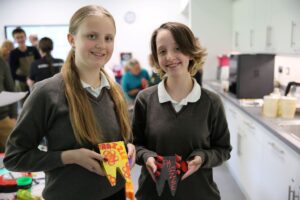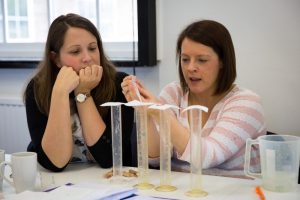Scientists: behind the scenes
Thursday 22nd October 2015
What do scientists get up to on a daily basis? We’ve asked researchers working across the sciences to give some insight into what a typical work day involves. Here are some of their stories:

Omur Tastan, a postdoctoral research scientist and lab manager in the Department of Physiology, Anatomy and Genetics, University of Oxford is learning about the human brain by studying fruit flies.
I come into the lab in the morning. First thing I check on my ~500 tubes of fruit fly stocks with different
genotypes. I dissect fruit fly larvae to analyse their brains and look for many different molecules in brain stem cells. I also work with human cells and use them to test for similarities between fruit flies and humans. I construct fluorescently tagged molecules and visualise them in fruit fly and human cells. Most of the time, we discover great similarities which improves our understanding of humans by studying simple fruit flies.
Angus Cook, a PhD student in the Corrosion Group at the University of Birmingham works on corrosion chemistry.
- Puzzled by convention by which soil sulphate analysis labelled as ‘SO3’ (that’s sulphite, surely?). Prepare environmental loggers for bulk calibration in humidity chamber.
- Colleague comes in to lab having lost precious sample in office. Spend 30 minutes pulling apart office looking for precious sample. Admit defeat.
- Find concrete scientists have also used sulphate = ‘SO3’ convention. E-mail friendly concrete scientist with questions.
- Colleague finds sample in lunchbox. Elation!
- Program loggers and humidity chamber for weekend-long test.
- Undergraduate student comes with questions about project and literature. Questions answered (some satisfactorily).
- Friendly concrete scientist replies. Answers!
- Promise to tidy lab on Monday.
Daniel Biggs is a research assistant at the Transgenic Core, based in the Wellcome Trust Centre for Human Genetics. He works in cell and molecular biology.
Daily life at the moment is changing all the time. My fiancée is fast approaching the end of her pregnancy so we are very excited about our new addition and very aware that our days will change. An average day begins with making breakfast and lunch for us both, as I do, I plan my work day. I have PCR’s to do, cell culture to do and to plan for future experiments with my supervisor and I have some housekeeping tasks to do as well. My days can be similar, but no two are ever the same.
Charlotte Hartwright is a Postdoctoral Research Associate in the Department of Experimental Psychology at the University of Oxford. She is conducting research to examine brain development and mathematical ability in children and adolescents.
I’m running a brain science session with 80 sixth-formers next week. Trying to find time to write the session is proving difficult, as there’s a deluge of mathematicians and chemists to talk to about having their brains scanned. Later, I have to decide whether someone else’s research is of sufficient scientific quality to be published; that’ll be a job for this evening, I expect.
Some of my analyses have finally finished, after taking over a week to run on a ‘super computer’. This is my favourite bit – after many months of work, a few final lines of code and…
Louise Gildea is a research associate at the Department of Surgery and Cancer, St Mary’s Hospital Campus, Imperial College London. She’s working on surgical metabolomics.
I am helping develop the “iKnife”, which analyses the smoke produced from an electrosurgical knife used during operations. We use mass spectrometry in hospital labs, and on a typical day, I will analyse human tissue removed during an operation to obtain mass spectra of the chemicals within the tissue. I maintain the mass spectrometers, record spectra and perform data analysis to build data models identifying healthy versus cancerous tissue. Sometimes I will be in the operating theatre recording spectra as the operation takes place so it can be quite varied!
Sarah Bearchell is a freelance science presenter at ‘Sarah’s adventure in Science’ in Oxfordshire. Most of her work is with primary school audiences in Oxfordshire. She also specialises in science for the very young and for children with Special Educational Needs and Disabilities.
I had an unusual day today. I went to The Science Museum in London for a meeting with the British Science Association about their annual Demo Day. This is a day where teachers and technicians pledge to “do a demo” for their class or the school. We discussed how previous year’s work can be built on to encourage more schools to participate. Then I had a quick vroom around the galleries of the museum…because it would be rude not to!



